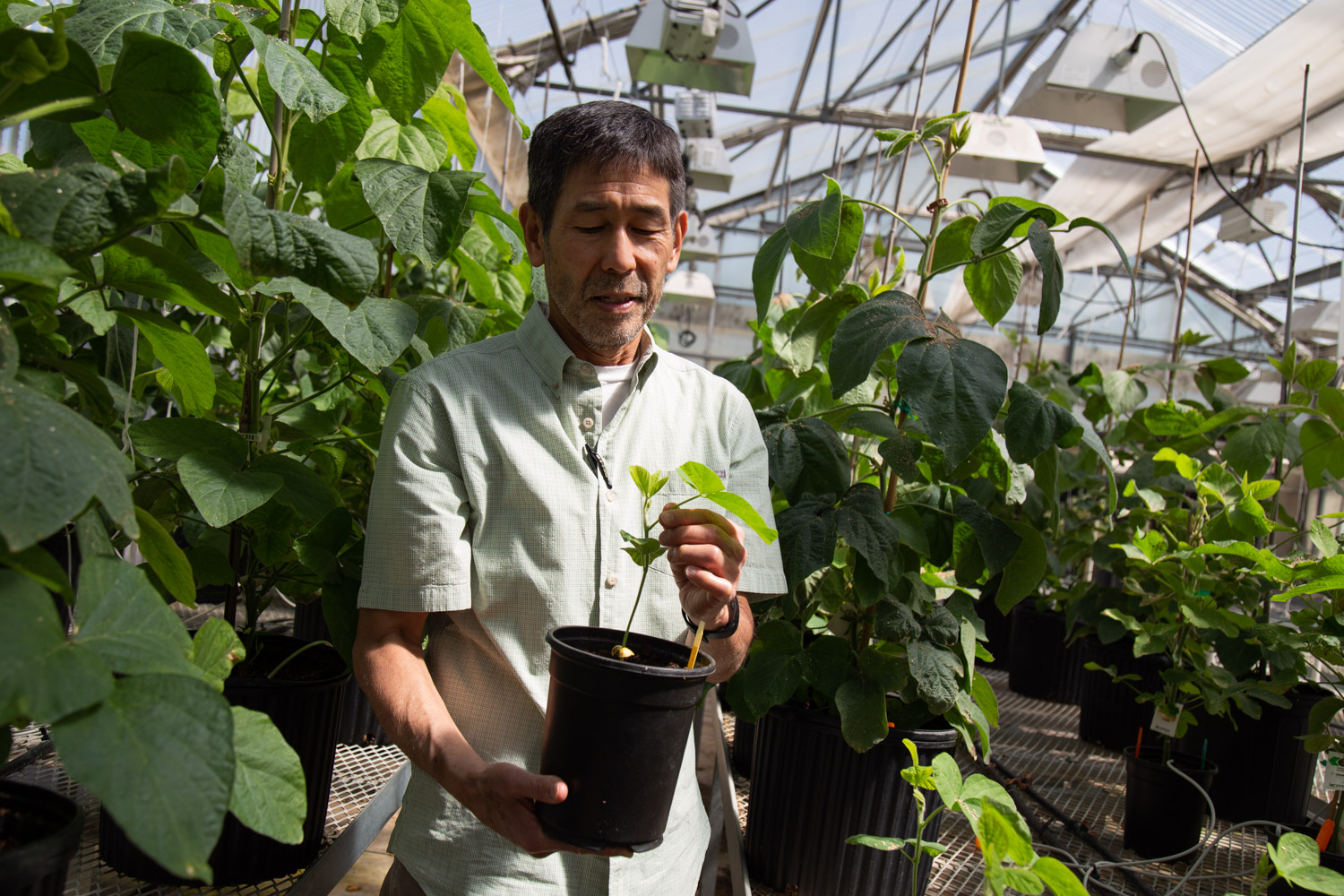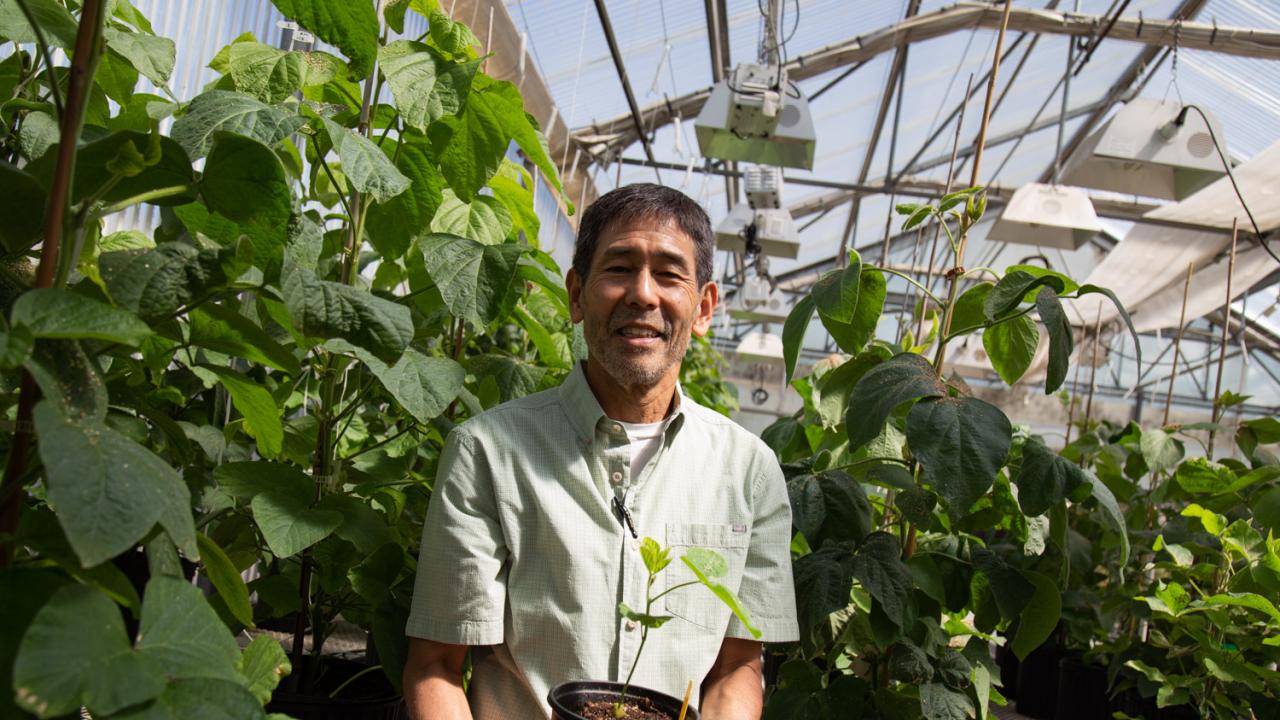
Nurturing Seeds and Growing Minds: John Harada Steps Down as Executive Associate Dean of Academic Affairs
Quick Summary
- For the past six years, John Harada has served as the College of Biological Sciences' Executive Associate Dean of Academic Affairs
- During Harada’s term, the campus initiated a new process to advance faculty through the merit and promotion system
- Harada will return his attention to his lab, where he studies seeds and the gene networks governing their development
Following his graduation from Garfield High School in East Los Angeles, John Harada wasn’t sure what to expect from higher-ed. A first-generation college student, he navigated his freshman year at the University of California, Los Angeles without a strong network nor much academic direction. He knew he liked biology and thought the natural route, professionally speaking, was to pursue medicine. He then took his first biochemistry class with Charles West, now a professor emeritus of chemistry and biochemistry. Harada’s life changed.
“It dawned on me,” said Harada, “that what this guy is saying is that all of life is just directed chemistry.”
With a new outlook, Harada spent the succeeding years completing a B.S. in biochemistry and followed that degree with a Ph.D. in biochemistry from the University of Washington. Along the way, he discovered an affinity for the complexities of biochemistry.
Today, Harada focuses his research on seeds and the gene networks governing their development. With his colleagues, he’s using techniques called laser capture microdissection and chromatin immunoprecipitation to understand the underlying genetics of seeds to help make an important food source even more nutritious.
“Seeds feed the world,” said Professor Harada, Department of Plant Biology. “It’s been estimated that 75 percent of the calories that are consumed by humans actually come from seeds.”
“If you can change the nutritional quality of seeds, or the number of seeds or the size of the seeds that crops are able to produce then you can increase yields,” he added.
On top of his research, Harada has served as the College of Biological Sciences’ Executive Associate Dean of Academic Affairs for the past six years. He stepped down from the post at the end of June.
“As the primary academic executive officer for the college, John administers faculty personnel matters and provides thought leadership and collaborates across many academic areas,” said College of Biological Sciences Dean Mark Winey. “He’s has been an instrumental force in shaping the vision, direction and outreach of many of our programs.”
During Harada’s term, the campus initiated a new process to advance faculty through the merit and promotion system. Harada said “Implementation of the step plus system has allowed CBS faculty to be rewarded not only for their outstanding research, but also for their excellence in teaching and service.”
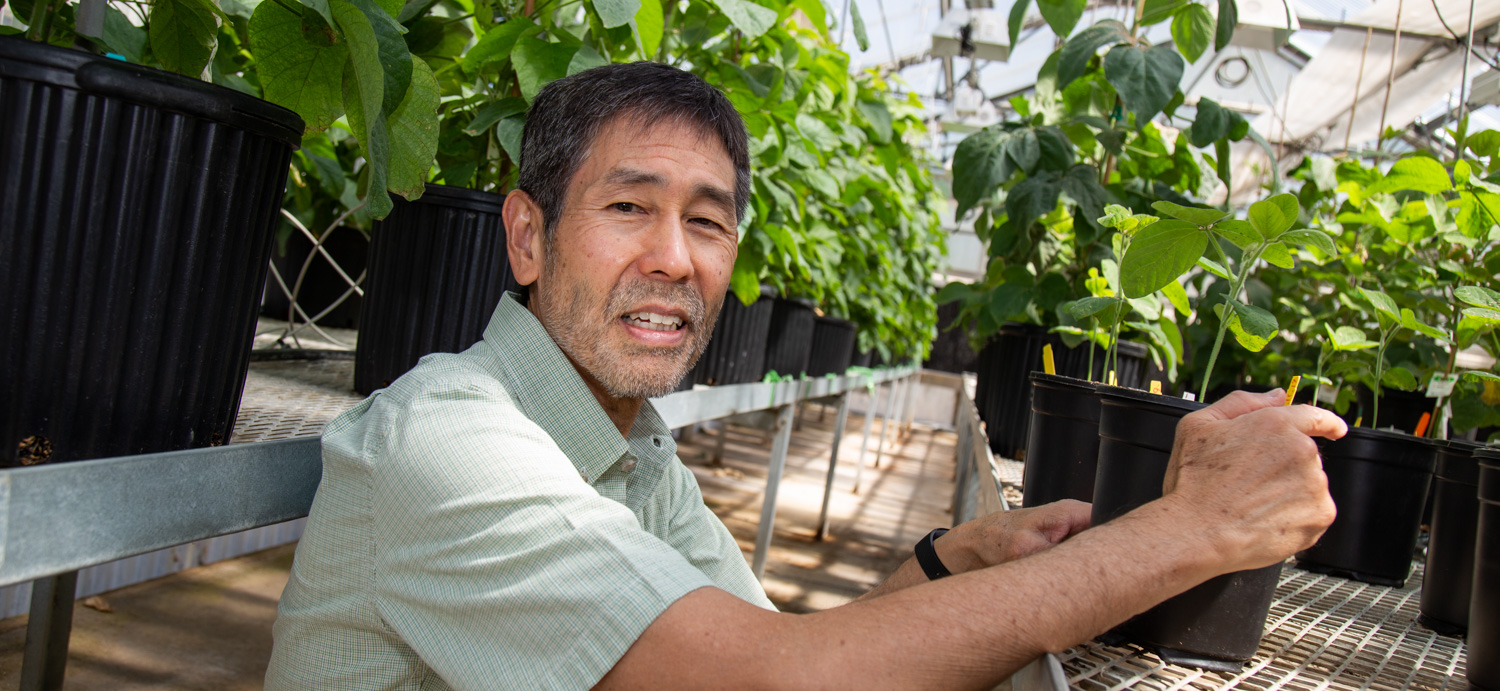
Sowing the seeds of scientific progress
By 1981, the year Harada received a Ph.D. degree, molecular biology was a nascent but budding field.
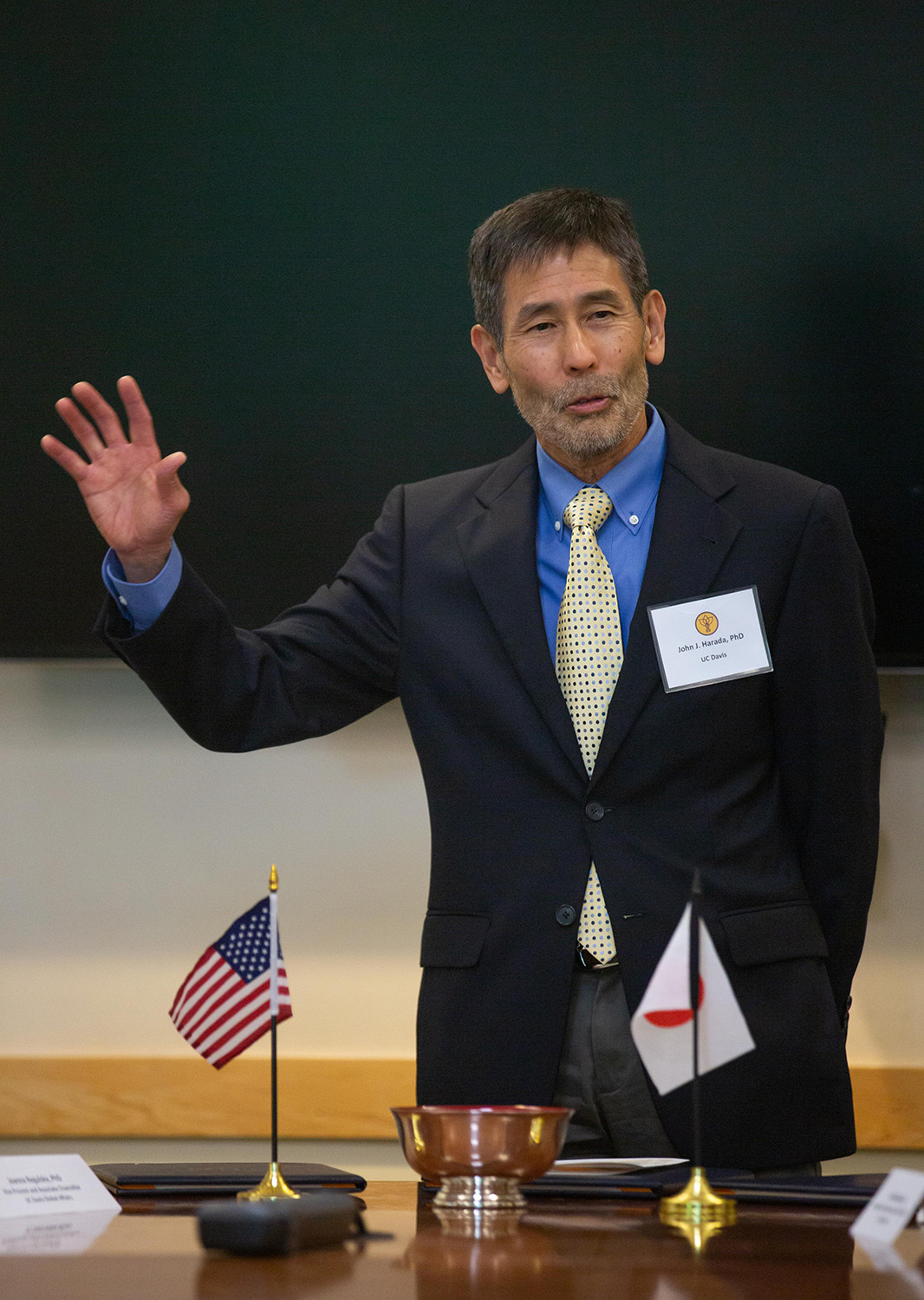
Harada returned to UCLA and took a postdoctoral position in the lab of Bob Goldberg, now a distinguished professor of molecular, cell and development biology. In the Goldberg Lab, Harada worked on plant genetics, examining the genes responsible for producing a class of storage proteins in soybean seeds. It was “the bad old days of biology,” according to Harada, and while the technology available at the time was making waves, it was cumbersome compared to the later revolution of genomic sequencing in the 1990s.
“Now we’re in the age of high-throughput sequencing, so now people just sequence genomes; they sequence transcriptomes,” he said. “It’s really amazing. It tells you that many of the major advances in biology are dictated by technology.”
Before, the process of determining what genes are active consisted of taking cloned DNA copies of a messenger RNA, separating their strands and allowing them to reconnect with RNA. Via this process, researchers could measure the level at which a gene is expressed.
In 1984, following his postdoctoral work, Harada joined the UC Davis faculty. He was attracted to the campus for its reputation in plant biology and agriculture. Though he was interested in plants, Harada didn’t actually have any formal training in plant biology.
“I wanted to go to a place where if I had questions, I could ask people,” he said. “I found out when I got here, I could ask people specific questions about plant biology and in many cases, the world expert was on the faculty here.”
“There were no downsides to coming to UC Davis,” he added. “The faculty here is outstanding.”
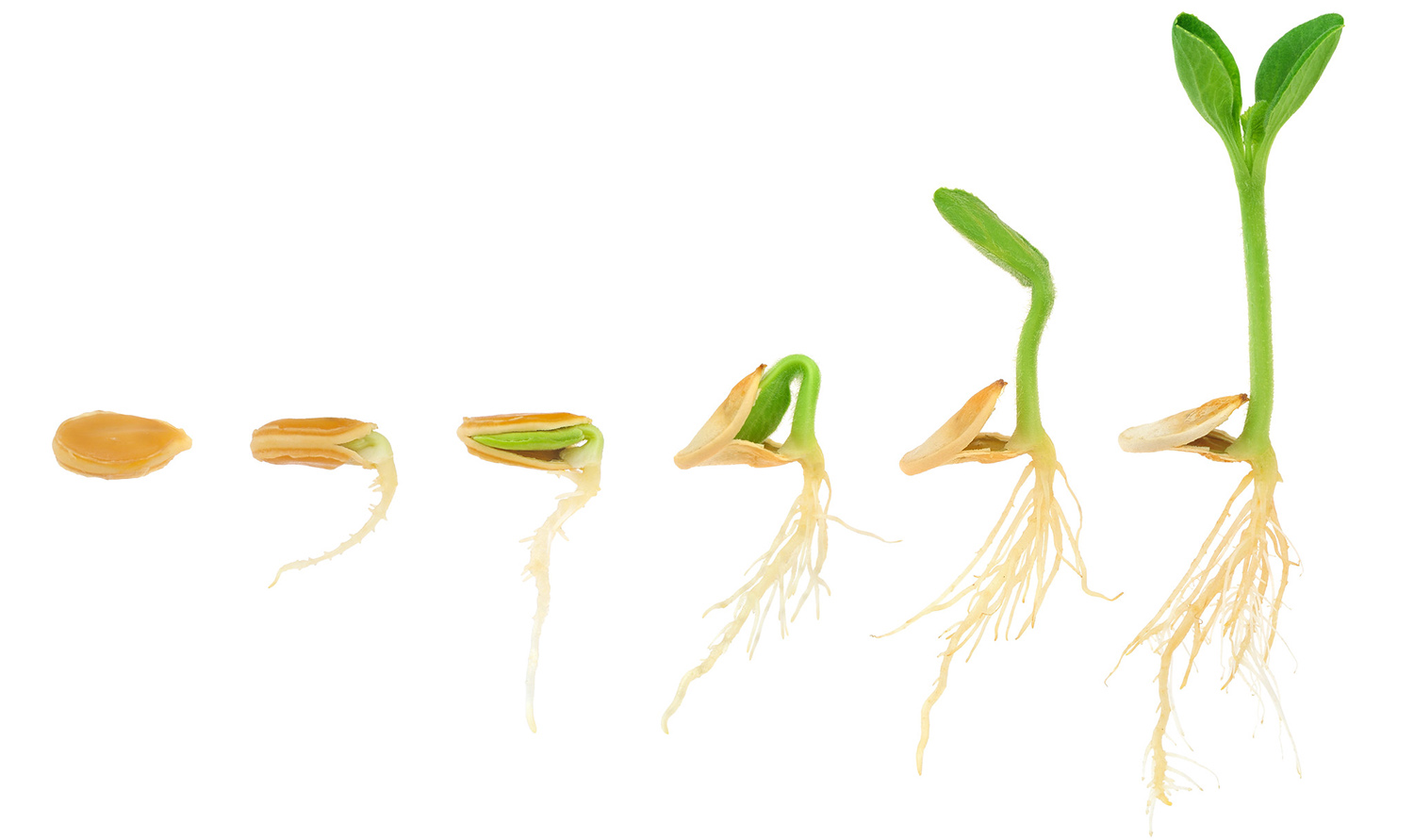
Fostering collaboration and exploring seed genetic networks
That mentality of collaboration that initially attracted Harada to UC Davis is something he’s helped the college nurture over the years.
“Most of graduate education in the U.S. is department-based,” said Harada. “A lot of the reason why I think there’s such great collaboration at UC Davis is because of the graduate group system.”
Unlike a department-based system, graduate groups at UC Davis run university-wide, meaning faculty with appointments across many different departments, colleges and schools on campus can participate in graduate curriculum and instruction based on their subject matter expertise. Harada is a member of the Biochemistry, Molecular, Cellular and Developmental Biology Graduate Group, the Integrative Genetics and Genomics Graduate Group and the Plant Biology Graduate Group, which each offer specialties and focus areas.
“These students are taking different classes, having different experiences and yet, they’re all in the same lab, so they can teach each other,” he said. “This integration often encourages interdisciplinary research.”
After stepping down from his post as executive associate dean for academic affairs, Harada will continue his genetic research on seed development. Currently, Harada, his lab members and colleagues with UCLA’s Goldberg Lab are collaborating on a National Science Foundation-funded project to understand the genes underlying the soybean seed.
Using laser capture microdissection and chromatin immunoprecipitation experiments, Harada and his colleagues peer at the organization of the seed’s gene networks throughout its developmental process, from morphogenesis to maturation.
“We can watch this developmental shift occurring in what genes are turning on and turning off, and where they’re turning on and off in different parts of the seed,” he said. “We’ve been really able to obtain lots of insights into what’s occurring in the seeds that people really didn’t know about before.”
Like a conductor trying to orchestrate a sublime performance, Harada is trying to figure out the genetic balance that leads to healthy and nutritious seeds.
“It’s been estimated that by the year 2050, we’re going to need to be able to produce anywhere between 70 to 100 percent more food than we produce now,” he said. “We have to do that in the face of global climate change. Hopefully, the information that we generate will help to meet this challenge.”
